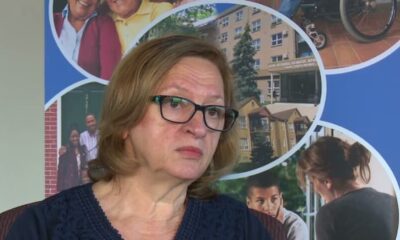Politics
Alberta’s Education Funding Crisis Sparks Concerns Over Choices

The ongoing debate over education funding in Alberta has intensified following recent decisions by the Edmonton Public Library to remove over 200 books in compliance with new provincial guidelines. Critics are voicing their concerns about the implications of such measures, particularly in a province led by Premier Danielle Smith, who has been accused of prioritizing the interests of her political base over the needs of the community.
Rochelle Carrière Hatton from Sudbury, Ontario, highlighted the challenges posed by the current funding model. She argued that although the government frequently cites the amount allocated per student as a measure of adequate funding, this statistic fails to reflect the reality faced by schools. The per-student funding, which seems sufficient in theory, is divided among various school budgets, forcing principals to manage with increasingly limited resources.
As inflation, rising enrollment, and diverse student needs continue to outpace funding, many schools are struggling to maintain essential services. Carrière Hatton emphasized that the issue is not one of management but rather one of inadequate financial support. In her view, the government’s insistence that schools need to budget more effectively trivializes the serious challenges educators face daily.
In Edmonton, Patrick Preston called for Premier Smith to experience firsthand the difficult decisions principals must make. He challenged her to spend a day with school leaders, observing the balancing act of inadequate resources against the needs of hundreds of students. His request underscores a growing frustration among parents and educators regarding the current system.
The electricity sector is also under scrutiny, with concerns about rising power bills. John Brine, another Edmonton resident, expressed skepticism about the government’s plans to reform Alberta’s electricity generating systems. He noted that despite promises of modernization, residents are likely to face even higher monthly bills, raising questions about the affordability of essential services. Brine shared that his electricity costs have skyrocketed, averaging over $300 per month, which he deemed unmanageable for those on fixed incomes, such as seniors and individuals reliant on the Assured Income for the Severely Handicapped (AISH).
In the political arena, William Betteridge urged Pierre Poilievre, leader of the Conservative Party, to challenge the United Conservative Party (UCP) government on its fuel tax policies. He argued that the current 13-cent fuel tax is exacerbating inflation and transportation costs across Alberta, further straining the finances of everyday residents.
The discussions surrounding education and energy in Alberta reflect broader concerns about governance and policy impacts on citizens’ lives. As community members voice their opinions, the pressure is mounting on Premier Smith and her government to address these critical issues effectively.
Letters to the editor are encouraged, with a preference for concise submissions. Each letter must include a name, address, and contact number. Interested contributors can reach out via email to [email protected].
As Alberta navigates these challenges, the decisions made by its leaders will have lasting effects on education, energy, and the overall well-being of its residents.
-

 Politics4 weeks ago
Politics4 weeks agoSecwepemc First Nation Seeks Aboriginal Title Over Kamloops Area
-

 World5 months ago
World5 months agoScientists Unearth Ancient Antarctic Ice to Unlock Climate Secrets
-

 Entertainment5 months ago
Entertainment5 months agoTrump and McCormick to Announce $70 Billion Energy Investments
-

 Science5 months ago
Science5 months agoFour Astronauts Return to Earth After International Space Station Mission
-

 Lifestyle5 months ago
Lifestyle5 months agoTransLink Launches Food Truck Program to Boost Revenue in Vancouver
-

 Technology3 months ago
Technology3 months agoApple Notes Enhances Functionality with Markdown Support in macOS 26
-

 Lifestyle3 months ago
Lifestyle3 months agoManitoba’s Burger Champion Shines Again Amid Dining Innovations
-

 Top Stories2 months ago
Top Stories2 months agoUrgent Update: Fatal Crash on Highway 99 Claims Life of Pitt Meadows Man
-

 Politics4 months ago
Politics4 months agoUkrainian Tennis Star Elina Svitolina Faces Death Threats Online
-

 Sports5 months ago
Sports5 months agoSearch Underway for Missing Hunter Amid Hokkaido Bear Emergency
-

 Politics5 months ago
Politics5 months agoCarney Engages First Nations Leaders at Development Law Summit
-

 Technology5 months ago
Technology5 months agoFrosthaven Launches Early Access on July 31, 2025




















